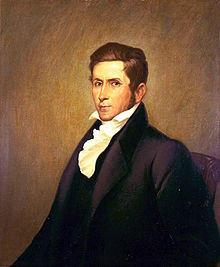Mahlon Dickerson
Mahlon Dickerson (born April 17, 1770 in Hanover , Morris County , New Jersey province , † October 5, 1853 in Succasunna , New Jersey ) was an American lawyer and politician and from 1815 to 1817 governor of the state of New Jersey. Between 1817 and 1833 he represented his state in the US Senate ; from 1834 to 1838 he was Secretary of the Navy under Presidents Andrew Jackson and Martin Van Buren . He was also a temporary federal judge in the federal district court for the district of New Jersey.
Early years and political advancement
Mahlon Dickerson enjoyed a private education and then studied until 1789 at the College of New Jersey , from which Princeton University later emerged. After studying law, he was admitted to the bar in 1793. In 1794 he was a member of the New Jersey militia involved in the crackdown on the Whiskey Rebellion in Pennsylvania . He then settled in Philadelphia as a lawyer for some time . He later moved his practice to New Jersey.
Dickerson's political rise began in Pennsylvania. In 1802, he was in that state commissioner for handling bankruptcies ( Commissioner of bankruptcy ). From 1805 to 1808 he was Adjutant General Head of the Pennsylvania Militia and between 1808 and 1810 he was the City Clerk of the City of Philadelphia. He also served as Attorney General of Pennsylvania between 1808 and 1809 . In 1810 he moved to Morris County, New Jersey. Dickerson was a member of Thomas Jefferson's Democratic Republican Party . From 1811 to 1813 he was a member of the New Jersey Parliament , which was then called the State Assembly . Between 1813 and 1815 he was both secretary and judge on the Supreme Court of his state. Since 1807 he was an elected member of the American Philosophical Society .
Governor and US Senator
In 1815 and 1816, Dickerson was elected governor for one year by the New Jersey Legislature . During his tenure, New Jersey became the first US state ever to approve protective tariffs. At that time, the first steps for the construction of the Delaware-Raritan Canal were initiated. After being elected to the US Senate, Dickerson resigned as governor on February 1, 1817.
In Congress on March 4, 1817, Dickerson became a Class 2 Senator, succeeding John Condit . After a re-election in 1823, he held this mandate until January 30, 1829. On that day, he resigned in order to simultaneously take on a new mandate in the Senate as a Class 1 Senator . He took over this mandate from Senator Ephraim Bateman , who died on January 28th . Overall he was between March 4, 1817 and March 3, 1833 member of the Senate. He was Chairman of the Archives Committee ( Committee on Library ) and a member of the Committee on Commerce and Manufacturers .
During his time in Congress, the political landscape in the United States changed. His Democratic Republican Party disbanded and Dickerson joined President Andrew Jackson's new Democratic Party .
Minister in the Jackson Cabinet
After the end of his tenure in the Senate, he became a member of the New Jersey Governing Council, which later became the New Jersey Senate . In 1834 he turned down an offer from the president to go to Russia as the American ambassador . Jackson then appointed him to his cabinet as the new Secretary of the Navy in June 1834 . He held this office under Jackson's successor, Martin Van Buren, until June 1838. In 1840, he succeeded the late William Rossell as a judge at the United States District Court for the District of New Jersey . In 1844 he was a delegate at a meeting to amend the state constitution. Mahlon Dickerson died in 1853. His younger brother Philemon (1788-1862) was Governor of New Jersey from 1836 to 1837, between 1833 and 1840 intermittently a member of the United States House of Representatives and his successor as federal judge in New Jersey.
Web links
- Mahlon Dickerson in the National Governors Association (English)
- Mahlon Dickerson in the Biographical Directory of the United States Congress (English)
- Mahlon Dickerson in the Miller Center of Public Affairs of the University of Virginia (English)
- Mahlon Dickerson in the database of Find a Grave (English)
Individual evidence
- ^ Member History: Mahlon Dickerson. American Philosophical Society, accessed July 15, 2018 .
| personal data | |
|---|---|
| SURNAME | Dickerson, Mahlon |
| BRIEF DESCRIPTION | American lawyer and politician |
| DATE OF BIRTH | April 17, 1770 |
| PLACE OF BIRTH | Hanover , New Jersey Province |
| DATE OF DEATH | October 5, 1853 |
| Place of death | Succasunna , New Jersey |



